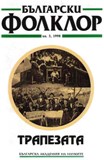Хранителни етикети на другостта
Dietary Labels of the Others
Author(s): Galia ValchinovaSubject(s): Anthropology
Published by: Институт за етнология и фолклористика с Етнографски музей при БАН
Summary/Abstract: Diet is one of the main features in the cultural construction of society. What and how to eat, what and how to drink are conceived, by the evidence of the items involved in cooking operation, and by the human attitudes related to their processing and consumption, as guidelines along which people can trace similitudes and differences between cultures. The designation of human groups after the dietary habits they exhibit, as “eaters of X” or, “drinkers of Y”, proves to be one of the most ancient and the most practiced cognitive scheme of the “others”. The paper is aimed to exemplify this viewpoint through some dietary labels the ancient Greeks have given the “Barbarians from the North” generally speaking, and Thracians and Scythians in particular. This is an attempt to delineate the history of the designations of these two peoples as both “eaters/drinkers of milk” γαλακτοφάγοι and “drinkers of wine” οίνοποτες, in the light of the multi-dimensional Greek concept of diaita. Explorations of the available literary sources allow to identify two different strategies – both reflecting the logic of the construction of alterity, in the ascription of the mentioned labels of Thracians and Scythians. This is particularly obvious as regards to the use of “drinkers of wine”. The Greek image of Thracians as “heavy drinkers” develops through many stages: having perceived Thrace itself as a “land of wine”, the Greeks “found” different kinds of drinkers in the Thracian space before to speak of the Thracian passion for – and practice to drink unmixed wine. The “Thracian space” is, thus, spoken of as a cultural geography developing in a socio-cultural system which is, finally, qualified by one “cultural trait” – the manners of eating/drinking. The image of “Scythian drinking” is created in a quite different way: it springs without any preliminary “appropriation” of Scythian cultural geography in the sense it is made with Thrace. It appears that this image is closely related to a more general representation of a “Scythian way of life” which, for a given period at least, could be equated with the lack of “civilized manners”. Products and ways of eating and drinking constitute an important link of the highly contiguous Greek perception of the Others. To correlate them with the general economic orientation of a given “barbarian” society, the patterns (or the lack) or settled life, the political structure and the war strategies, the patterns of kinship, family life and matrimonial politics, the religious system, opens new perspectives on ethnological research of the ancient Balkan societies.
Journal: Български фолклор
- Issue Year: XXIV/1998
- Issue No: 3
- Page Range: 9-20
- Page Count: 12
- Language: Bulgarian
- Content File-PDF

